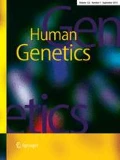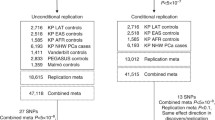Abstract
Prostate-specific antigen (PSA) is a commonly used cancer biomarker for prostate cancer, and is often included as part of routine physical examinations in China. Serum levels of PSA may be influenced by genetic factors as well as other factors. A genome-wide association study (GWAS) conducted in a European population successfully identified six genetic loci that were significantly associated with PSA level. In this study, we aimed to identify common genetic variants that are associated with serum level of PSA in a Chinese population. We also evaluated the effects of those variants by creating personalized PSA cutoff values. A two-stage GWAS of PSA level was performed among men age 20–69 years and self-reported cancer-free participants that underwent routine physical examinations at several hospitals in Guangxi Province, China. Single nucleotide polymorphisms (SNPs) significantly associated with PSA levels in the first stage of sample (N = 1,999) were confirmed in the second stage of sample (N = 1,496). Multivariate linear regression was used to assess the independent contribution of confirmed SNPs and known covariates, such as age, to the level of PSA. SNPs in three regions were significantly associated with levels of PSA in this two-stage GWAS, and had combined P values between 4.62 × 10−17 and 6.45 × 10−37. The three regions are located on 1q32.1 at SLC45A3, 10q11.23 at MSMB, and 19q13.33 at KLK3. The region 1q32.1 at SLC45A3 was identified as a novel locus. Genetic variants contributed significantly more to the variance of PSA level than known covariates such as age. Personalized cutoff values of serum PSA, calculated based on the inheritance of these associated SNPs, differ considerably among individuals. Identification of these genetic markers provides new insight into the molecular mechanisms of PSA. Taking individual variation into account, these genetic variants may improve the performance of PSA to predict prostate cancer.


Similar content being viewed by others
References
Bansal A, Murray DK, Wu JT, Stephenson RA, Middleton RG, Meikle AW (2000) Heritability of prostate-specific antigen and relationship with zonal prostate volumes in aging twins. J Clin Endocrinol Metab 85:1272–1276
Eeles RA, Kote-Jarai Z, Giles GG, Olama AA, Guy M, Jugurnauth SK, Mulholland S, Leongamornlert DA, Edwards SM, Morrison J, Field HI, Southey MC, Severi G, Donovan JL, Hamdy FC, Dearnaley DP, Muir KR, Smith C, Bagnato M, Ardern-Jones AT, Hall AL, O’Brien LT, Gehr-Swain BN, Wilkinson RA, Cox A, Lewis S, Brown PM, Jhavar SG, Tymrakiewicz M, Lophatananon A, Bryant SL, Horwich A, Huddart RA, Khoo VS, Parker CC, Woodhouse CJ, Thompson A, Christmas T, Ogden C, Fisher C, Jamieson C, Cooper CS, English DR, Hopper JL, Neal DE, Easton DF (2008) Multiple newly identified loci associated with prostate cancer susceptibility. Nat Genet 40:316–321. doi:10.1038/ng.90
Gudmundsson J, Besenbacher S, Sulem P, Gudbjartsson DF, Olafsson I, Arinbjarnarson S, Agnarsson BA, Benediktsdottir KR, Isaksson HJ, Kostic JP, Gudjonsson SA, Stacey SN, Gylfason A, Sigurdsson A, Holm H, Bjornsdottir US, Eyjolfsson GI, Navarrete S, Fuertes F, Garcia-Prats MD, Polo E, Checherita IA, Jinga M, Badea P, Aben KK, Schalken JA, van Oort IM, Sweep FC, Helfand BT, Davis M, Donovan JL, Hamdy FC, Kristjansson K, Gulcher JR, Masson G, Kong A, Catalona WJ, Mayordomo JI, Geirsson G, Einarsson GV, Barkardottir RB, Jonsson E, Jinga V, Mates D, Kiemeney LA, Neal DE, Thorsteinsdottir U, Rafnar T, Stefansson K (2010) Genetic correction of PSA values using sequence variants associated with PSA levels. Sci Transl Med 2: 62ra92. doi:10.1126/scitranslmed.3001513
Hernandez J, Thompson IM (2004) Prostate-specific antigen: a review of the validation of the most commonly used cancer biomarker. Cancer 101:894–904. doi:10.1002/cncr.20480
Jemal A, Bray F, Center MM, Ferlay J, Ward E, Forman D (2011) Global cancer statistics. CA Cancer J Clin 61:69–90. doi:10.3322/caac.20107
Jian L, Xie LP, Lee AH, Binns CW (2004) Protective effect of green tea against prostate cancer: a case-control study in southeast China. Int J Cancer 108:130–135. doi:10.1002/ijc.11550
Marchini J, Howie B, Myers S, McVean G, Donnelly P (2007) A new multipoint method for genome-wide association studies by imputation of genotypes. Nat Genet 39:906–913. doi:10.1038/ng2088
Perner S, Rupp NJ, Braun M, Rubin MA, Moch H, Dietel M, Wernert N, Jung K, Stephan C, Kristiansen G (2012) Loss of SLC45A3 protein (prostein) expression in prostate cancer is associated with SLC45A3-ERG gene rearrangement and an unfavorable clinical course. Int J Cancer. doi:10.1002/ijc.27733
Price AL, Patterson NJ, Plenge RM, Weinblatt ME, Shadick NA, Reich D (2006) Principal components analysis corrects for stratification in genome-wide association studies. Nat Genet 38:904–909. doi:10.1038/ng1847
Purcell S, Neale B, Todd-Brown K, Thomas L, Ferreira MA, Bender D, Maller J, Sklar P, de Bakker PI, Daly MJ, Sham PC (2007) PLINK: a tool set for whole-genome association and population-based linkage analyses. Am J Hum Genet 81:559–575. doi:10.1086/519795
Schroder FH, Hugosson J, Roobol MJ, Tammela TL, Ciatto S, Nelen V, Kwiatkowski M, Lujan M, Lilja H, Zappa M, Denis LJ, Recker F, Berenguer A, Maattanen L, Bangma CH, Aus G, Villers A, Rebillard X, van der Kwast T, Blijenberg BG, Moss SM, de Koning HJ, Auvinen A (2009) Screening and prostate-cancer mortality in a randomized European study. N Engl J Med 360:1320–1328. doi:10.1056/NEJMoa0810084
Shao Q, Ouyang J, Fan Y, Xie J, Zhou J, Wu J, Karim Kader A, Xu J, Liu G, Shan Y, Wen D, Zhang Y et al (2012) Prostate cancer in the senior men from rural areas in east district of China: contemporary management and 5-year outcomes at multi-institutional collaboration. Cancer Lett 315:170–177. doi:10.1016/j.canlet.2011.09.035
Tan A, Gao Y, Yang X, Zhang H, Qin X, Mo L, Peng T, Xia N, Mo Z et al (2011) Low serum osteocalcin level is a potential marker for metabolic syndrome: results from a Chinese male population survey. Metab, Clin Exp 60:1186–1192. doi:10.1016/j.metabol.2011.01.002
Thompson IM, Ankerst DP, Chi C, Lucia MS, Goodman PJ, Crowley JJ, Parnes HL, Coltman CA Jr (2005) Operating characteristics of prostate-specific antigen in men with an initial PSA level of 3.0 ng/ml or lower. JAMA 294:66–70. doi:10.1001/jama.294.1.66
Walker MG, Volkmuth W, Sprinzak E, Hodgson D, Klingler T (1999) Prediction of gene function by genome-scale expression analysis: prostate cancer-associated genes. Genome Res 9:1198–1203
Xu J, Kalos M, Stolk JA, Zasloff EJ, Zhang X, Houghton RL, Filho AM, Nolasco M, Badaro R, Reed SG (2001) Identification and characterization of prostein, a novel prostate-specific protein. Cancer Res 61:1563–1568
Xu J, Mo Z, Ye D, Wang M, Liu F, Jin G, Xu C, Wang X, Shao Q, Chen Z, Tao Z, Qi J, Zhou F, Wang Z, Fu Y, He D, Wei Q, Guo J, Wu D, Gao X, Yuan J, Wang G, Xu Y, Yao H, Dong P, Jiao Y, Shen M, Yang J, Ou-Yang J, Jiang H, Zhu Y, Ren S, Zhang Z, Yin C, Dai B, Hu Z, Yang Y, Wu Q, Chen H, Peng P, Zheng Y, Zheng X, Xiang Y, Long J, Gong J, Na R, Lin X, Yu H, Tao S, Feng J, Sun J, Liu W, Hsing A, Rao J, Ding Q, Wiklund F, Gronberg H, Shu XO, Zheng W, Shen H, Jin L, Shi R, Lu D, Zhang X, Zheng SL, Sun Y (2012) Genome-wide association study in Chinese men identifies two new prostate cancer risk loci at 9q31.2 and 19q13.4. Nat Genet. doi:10.1038/ng.2424
Acknowledgments
We thank the local research teams from Fangchenggang First People’s Hospital, Guigang People’s Hospital and Yulin First People’s Hospital for their contribution to the recruitment of study subjects. We thank X-W Zou, H–C Zheng and O Li at the Genergy Biotechnology (Shanghai) Co., Ltd, for their assistance in the genotyping. Finally, we thank all study subjects for participating in the study. This work was partially supported by the General Program of National Natural Science Foundation of China (30945204, 30360124, 30260110), the Guangxi Provincial Department of Finance and Education (2009GJCJ150), and intramural funding from Fudan-VARI Center for genetic Epidemiology and intramural funding from Fudan University Institute of Urology.
Conflict of interest
There are no known conflicts of interest.
Author information
Authors and Affiliations
Corresponding author
Additional information
J. Sun, S. Tao, Y. Gao and T. Peng contributed equally to this work.
Electronic supplementary material
Below is the link to the electronic supplementary material.
Rights and permissions
About this article
Cite this article
Sun, J., Tao, S., Gao, Y. et al. Genome-wide association study identified novel genetic variant on SLC45A3 gene associated with serum levels prostate-specific antigen (PSA) in a Chinese population. Hum Genet 132, 423–429 (2013). https://doi.org/10.1007/s00439-012-1254-3
Received:
Accepted:
Published:
Issue Date:
DOI: https://doi.org/10.1007/s00439-012-1254-3




